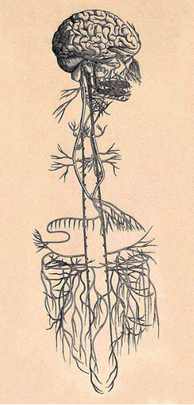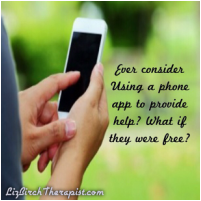 Let me begin by saying Hypnotherapy is not a type of therapy in itself. However, it is a great aid to Cognitive Behavioral Therapy. Cognitive Behavioral Hypnotherapy, which combines hypnosis with cognitive-behavioral therapy, helps change unwanted patterns and behaviors by connecting with the subconscious mind. It helps with psychotherapy because the hypnotic state allows a person to explore more painful thoughts and feelings that may be hidden from the conscious mind. The positive suggestions that people are given while hypnotized are referred to as “post hypnotic suggestions” because they are intended to take effect after the person emerges from the deep relaxation or trance and is no longer under hypnosis. Experts say that hypnotherapy can help the "stuck" thought patterns that go along with depression, anxiety, OCD, and other mood disorders. The fact is, however, that hypnosis is a genuine psychological phenomenon that has valid uses in clinical practice. Simply put, hypnosis is a state of highly focused attention or concentration, often associated with relaxation, and heightened suggestibility. While under hypnosis, it seems many people are much more open to helpful suggestions than they usually are. "Hypnosis works and the empirical support is unequivocal in that regard. It really does help people," says Michael Yapko, PhD, a psychologist and fellow of the American Society of Clinical Hypnosis. Hypnosis has been used for centuries for pain control, including during the Civil War when Army surgeons hypnotized injured soldiers before amputations. Recent studies have confirmed its effectiveness as a tool to reduce pain. Among the leading researchers in the field is Guy H. Montgomery, PhD, a psychologist who has conducted extensive research on hypnosis and pain management at Mount Sinai School of Medicine, where he is director of the Integrative Behavioral Medicine Program. In a 2009 article in Health Psychology (Vol. 28, No. 3), Montgomery and colleagues reported on a study, which found that a combination of hypnosis and cognitive-behavioral therapy could reduce fatigue for breast cancer patients undergoing radiation therapy. Hypnotherapy is a safe procedure when done by a trained therapist. Hypnotherapy is not mind control or brainwashing. Hypnotherapy is specifically designed to fit your needs. This means that each hypnotherapy session is designed for just you and allows for a very individualized approach. The reason that hypnotherapy can be so effective is because it is so person centered. If you have tried other treatments and not seen results, you should give hypnotherapy a try due to the fact that it is so person centered. Check with your insurance company to see if they specifically cover hypnotherapy.
9 Comments
 The Vagus Nerve is the longest cranial nerve in your body. Vagus means “wanderer” in Latin, which accurately represents how the nerve wanders all over the body and reaches various organs. The Vagus Nerve is also a key part of your parasympathetic “rest and digest” nervous system. It influences your breathing, digestive function and heart rate, all of which can have a significant impact on your mental health. It’s important to increase the “tone” of your vagus nerve, as having a higher vagal tone means that your body can relax faster after stress. In 2010, researchers discovered a positive feedback loop between high vagal tone, positive emotions, and good physical health. So the more you increase your vagal tone, the more your physical and mental health will improve. Studies have shown that vagal tone is passed on from mother to child. Mother’s who are depressed, anxious and angry during their pregnancy have lower vagal activity. Once they give birth, the newborn also has low vagal activity and low dopamine and serotonin levels. Don’t worry if you think you might have a low vagal tone! You can take steps to increase it by stimulating your vagus nerve. This will allow you to more effectively respond to the emotional and physiological symptoms of your brain and mental illness. By stimulating your vagus nerve you can help treat mental health conditions such as depression and anxiety. So how does one stimulate their vagus nerve? Look at the list below! 1. Cold Exposure Researchers have found that exposing yourself to cold on a regular basis can lower your sympathetic “flight or fight” response and increase parasympathetic activity through the vagus nerve. Try finishing your next shower with at least 30 seconds of cold water and see how you feel. Slowly work your way up to longer periods of that cold-water blast. The lingering effects are worth it! 2. Deep and Slow Breathing Most people take about 10 to 14 breaths each minute. Taking about 6 breaths over the course of a minute is a great way to reduce stress. You should breath in deeply from your diaphragm. When you do this, your stomach should expand outward. Your exhale should be long and slow. This is the key to stimulating the vagus nerve and reaching a state of relaxation. 3. Singing, Humming, Chanting and Gargling The vagus nerve is connected to your vocal cords and the muscles at the back of your throat. Singing, humming, chanting and gargling can activate these muscles and stimulate your vagus nerve. This has been shown to increase heart-rate variability and vagal tone. 4. Meditation Research shows that meditation increases vagal tone and positive emotions and promotes feelings of goodwill towards you. Another study found that meditation reduces sympathetic “flight or fight” activity and increases vagal modulation. “OM” chanting, which is often done during meditation, has also been shown to stimulate the vagus nerve. 5. Exercise Not only does exercise help reverse cognitive decline but it’s also been shown to stimulate the vagus nerve, which may explain its beneficial brain and mental health effects. Walking, weighlifting and sprinting are the best forms of exercise but you should do what you enjoy so that you will maintain it consistently. 6. Socializing and Laughing Reflecting on positive social connections improves vagal tone and increases positive emotions. Laughter has been shown to increase heart rate variability and increase mood. And vagus nerve stimulation often leads to laughter as a side effect, suggesting their connection. So laugh with your friends as much as possible! Conclusion By stimulating the vagus nerve, you can send a message to your body that it’s time to relax and de-stress, which leads to long-term improvements in mood, wellbeing and resilience. So give some of the above suggestions a try and see if you can overcome some of the depression and anxiety that arise. http://pss.sagepub.com/content/early/2013/05/06/0956797612470827.abstract www.ncbi.nlm.nih.gov/pubmed/22894892 I am a licensed Marriage & Family Therapist who can provide services with anyone who resides in the State of California. I have also been trained in Clinical Hypnotherapy which is beneficial for more specific goals. Liz Birch, LMFT, CHt ~ 714-584-6047 ~ [email protected]  1. Try Progressive Relaxation All the way from fingers to toes - tense and then release each muscle group in the body (lower arm, upper arm, chest, back and abdominals, etc.). Once the body is relaxed, the mind will be soon to follow! 2. Breathe Deep Taking a deep breath has been shown to lower cortisol levels, which can help reduce stress and anxiety. Studies suggest deep breathing can also cause a temporary drop in blood pressure. 3. Spark Some Scents Studies suggest aromatherapy can be a good way to relieve stress. Give Lavender a try! Scientific evidence suggests that aromatherapy with lavender may slow the activity of the nervous system, improve sleep quality, promote relaxation, and lift mood in people suffering from sleep disorders. 4. Laugh It Off Laughter can reduce the physical effects of stress (like fatigue) on the body. Look for a laughter workshop in your area. They are out there! 5. Drink Tea One study found that drinking black tea leads to lower post-stress cortisol levels and greater feelings of relaxation. 6. Exercise That post-exercise endorphin rush is one way to sharply cut stress. Endorphins are often classified to be the happy hormones. Any form of physical activity leads to the release of these feel good neurotransmitters. The increase in endorphins in your body leads to a feeling of euphoria, modulation of appetite, the release of different sex hormones and an enhancement of immune response. This helps combat the negative effects of stress. 7. Listen To Music Research points to multiple ways in which music can help relieve stress, from triggering biochemical stress reducers to assisting in treating stress associated with medical procedures. According to a group of fancy Oxford University scientists, listening to the third movement of Beethoven's No. 9 might actually lower your blood pressure and help fight heart disease. In real life. Isn’t this surprising?? "Professor Sleight explained some composers, including Verdi, seemed to have managed to mirror the natural rise and fall of blood pressure in the human body. Verdi may well have been a physiologist,' he said, 'he hit on this ten-second rhythm in blood pressure and you can see it in his music.'" — Elizabeth Davis, Classic FM
I am a licensed Marriage & Family Therapist who can provide services with anyone who resides in the State of California. I have also been trained in Clinical Hypnotherapy which is beneficial for more specific goals. Liz Birch, LMFT, CHt ~ 714-584-6047 ~ [email protected]  Over the past few years I’ve become accustomed to utilizing phone apps to help my clients get through some tough times. It’s not a replacement for me, their therapist, but they do help when my clients needs some "on the spot" aid. I thought I’d list a few that I use and ones that my clients have shared with me that they find helpful. If any of you have other apps that aid in calming, supporting, encouraging or do some crisis management until personal help is available I’d like to hear about them. Here are my top five that I’m able to access via my iphone.
Again none of the above mentioned apps are a replacement for in-person help but many of my clients have shared that they have been extremely helpful to them. Please list your favorite self help apps (and maybe some pros and cons) in the comment section below. It's great to learn what works, and doesn't, from others. I am a licensed Marriage & Family Therapist who can provide services with anyone who resides in the State of California. I have also been trained in Clinical Hypnotherapy which is beneficial for more specific goals. Liz Birch, LMFT, CHt ~ 714-584-6047 ~ [email protected] *photo courtesy of freedigitalphotos.net |
|

 RSS Feed
RSS Feed